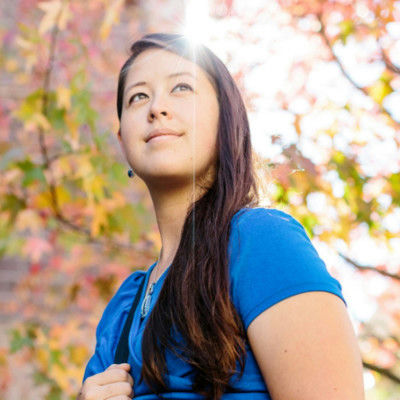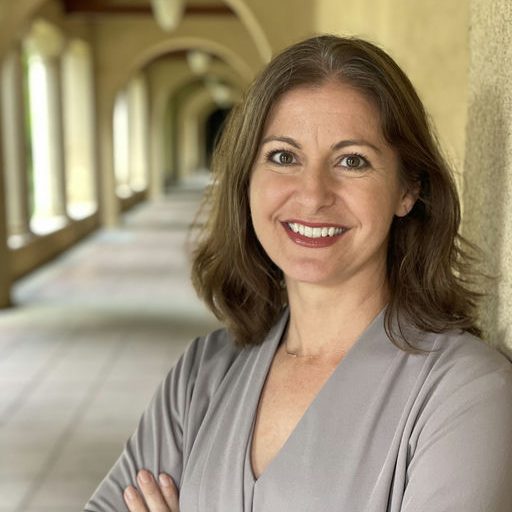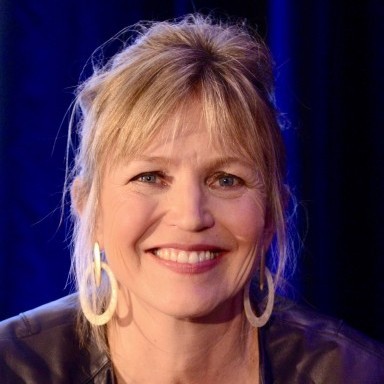Child Safety and Health Panel: Rebecca Portnoff, Laura Bravo Sánchez, Kimberly Babiarz
About This Video
WiDS Worldwide, Stanford Conference Panel: Child Safety and Health Panelists:
- Rebecca Portnoff, Head of Data Science, Thorn
- Laura Bravo Sánchez, PhD Candidate, Department of Biomedical Data Science, Stanford University
- Kimberly Babiarz, Research Director, Stanford Human Trafficking Data Lab, Stanford University
Moderated by: Margot Gerritsen, Professor Emerita & WiDS Co-Founder, Stanford University
In This Video

Head of Data Science, Thorn
Talk Title: Engaging with ML/AI: Combating Child Sexual Abuse
Abstract: Offline and online sexual harms against children have been accelerated by the internet. The child safety ecosystem is overtaxed; in 2022 reports to the National Center for Missing and Exploited Children (NCMEC) contained over 88 million files of child sexual abuse material (CSAM) and other files related to child sexual exploitation.
Thorn is a non-profit that is dedicated to building technology to combat child sexual abuse. Our work at Thorn is focused on: accelerating victim identification, stopping re-victimization (the viral spread of CSAM) and preventing abuse from happening in the first place. Machine Learning/AI plays an important role in this work. In this talk, we will give an overview of some of this technology we’ve built at Thorn, how we prioritize wellness in building this technology, and how we collaborate cross-functionally to deploy this technology internally and externally to have impact.
Bio: Dr. Rebecca Portnoff has dedicated her career to building tools and driving initiatives to defend children from sexual abuse. She is currently Head of Data Science at Thorn, owning strategy and vision for Data Science across the organization and leading Thorn’s engagement with machine learning/artificial intelligence (ML/AI) as a field. She works cross functionally with business and technical functions to develop, deploy and maintain ML/AI to: accelerate victim identification, stop re-victimization, and prevent abuse from occurring.
Rebecca brings with her over a decade of experience in ML/AI, child safety, and trauma-informed leadership. She is also an avid musician, singing jazz and playing the violin in her free time. She holds a B.S.E. in Computer Science from Princeton University, where she also minored in vocal jazz, and a Ph.D. in Computer Science from UC Berkeley.

PhD Candidate, Department of Biomedical Data Science, Stanford University
Talk Title: How can Computer Vision guide the understanding of parent-child interactions?
Abstract: Understanding Parent-Child Interactions (PCI) is crucial for child development specialists, who rely on video as a primary tool in controlled and naturalistic settings to test their hypothesis. However, the increasing volume of video data poses challenges for manual analysis. In response, our research at the Stanford Medical AI and Computer Vision Lab is dedicated to developing Computer Vision techniques that both unlock the full potential of video data and streamline labor-intensive processes. This talk delves into the Computer Vision approaches tailored to PCI studies that we have been working on. We explore how our work aims to bridge the gap between the intrinsic subtleties of human behavior and the limitations of current 3D monocular human mesh recovery methods
Bio: Laura is currently a PhD Candidate in the Department of Biomedical Data Science at Stanford University. She is advised by Prof. Serena Yeung-Lévy and is supported by the Fulbright Minciencias Colombia Fellowship. Her research focuses on understanding human behavior through Computer Vision. In particular, she works on improving modeling of 3D human poses and interactions in video for parent-child interactions. Prior to her doctoral studies, she received her BSc. and MSc. from Universidad de los Andes in Colombia, where she worked on employing Computer Vision for surgical videos

Research Director, Stanford Human Trafficking Data Lab, Stanford University
Talk Title: Bringing AI-driven technologies to the fight against human trafficking in Brazil
Abstract: The Stanford Human Trafficking Data Lab is committed to fighting human trafficking through rigorous multidisciplinary research and data-driven policy interventions. Dr. Babiarz presents our team’s research to develop AI-driven tools to leverage unprecedented new data flows to enhance the work of anti-trafficking labor inspectors and prosecutors. Our decision support tool applies large language models to the task of pre-processing incoming labor trafficking tips, uses machine learning algorithms for improved inspection targeting and emergent hot spot identification, and trains object detection algorithms to identify illegal work sites from satellite images. Results from early version deployment demonstrate immediate success supporting frontline stakeholders in the fight against human trafficking.
Bio: Dr. Kimberly Babiarz specializes in large scale quantitative studies to evaluate the impact of public programs and interventions on health and well-being. As Research Director at the Stanford Human Trafficking Data Lab, she works on a large portfolio of projects, including the development and evaluation of new technologies to support anti-trafficking interventions and survivor support, quantitative research on trafficking markets and the protective role of public policy, and several direct collaborations with frontline anti-trafficking agencies. As an applied development economist, she has expertise in both quasi-experimental study designs and randomized controlled trials. Her work has also included studies on fertility and family planning programs, infant and maternal health, and the gender dynamics of global health. She holds a PhD in Agricultural and Resource Economics from the University of California, Davis (2011).

Co-Founder, WiDS Worldwide
Margot Gerritsen is a Professor at Stanford University and co-founder and co-director of WiDS Worldwide. Her expertise is in computational mathematics. She is particularly fond of computational fluid dynamics and linear algebra. Margot received her MS from TU Delft and her PhD from Stanford. Prior to her position at Stanford, she spent five years as a faculty member at the University of Auckland, New Zealand. Margot was born and raised in the Netherlands and left the flat lands in 1990 in search of hillier and sunnier places. She still has her Dutch accent. She currently lives in the Oregon mountains with her partner Paul.

